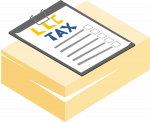District of Columbia LLC Taxes
Washington DC LLCs are taxed as pass-through entities by default, which means that LLC profits and losses pass through the business to the members/owners, who pay personal income tax on their share of the profits. LLC income is taxed federally at the 15.3% self-employment tax rate (12.4% for social security and 2.9% for Medicare). LLCs in the District of Columbia also need to pay an annual franchise tax of 8.25%. Below we explain the tax requirements for DC LLCs.
In this article, we’ll cover:


How Are DC LLCs Taxed?
Single-member LLCs (SMLLC) are taxed as disregarded entities by default, just like sole proprietors. Multi-member LLCs are taxed as partnerships by default. If your LLC keeps its default tax status, you will need to file one of these tax forms annually:
- Single-member LLC—Form 1040 (usually Schedule C, but some SMLLCs file C-EZ, E, or F)
- Multi-member LLC—Form 1065
Washington DC LLCs can also opt for S-corp or C-corp tax status. We’ll explain what that would mean for your business.
DC LLCs taxed as S-corp
Despite what many people think, an S-corp is a tax classification, not a type of business. Either LLCs or corporations can elect to be taxed as S-corps by filing IRS Form 2553. Businesses with S-corp status are taxed as pass-through entities and don’t pay federal corporate income tax. However, Washington DC S-corps are required to pay the district’s corporate franchise tax. S-corps can make distributions to their members that are not subject to the 15.3% self-employment tax.
Before filing to be taxed as an S-corp, consult a tax accountant and make sure this move makes financial sense for your business. If you choose to elect S-corp status, you’ll need to file IRS Form 1120-S annually.
LLCs taxed as C-corp
LLCs can also elect C-corp status, which is the default tax status for corporations. C-corps must pay the 21% federal corporate income tax and the DC 8.25% corporate franchise tax. C-corps have a few benefits over regular LLCs—they are eligible for more tax deductions and are more attractive to investors. However, you should consult a CPA before you elect C-corp status, as C-corp taxes are significantly more complicated than regular LLC taxes. C-corps file Form 1120 with the IRS.

District of Columbia Income Tax
Washington DC has a graduated individual income tax starting at 4%. Here are DC’s personal income tax rates:
|
Taxable income |
Tax: |
|---|---|
| $10,000 or lower | 4% of the taxable income |
| Over $10,000 but not over $40,000 | $400, plus 6% of the excess over $10,000 |
| Over $40,000 but not over $60,000 | $2,200, plus 6.5% of the excess over $40,000 |
| Over $60,000 but not over $250,000 | $3,500, plus 8.5% of the excess over $60,000 |
| Over $250,000 but not over $500,000 | $19,650, plus 9.25% of the excess over $250,000 |
| Over $500,000 but not over $1 million | $42,775, plus 9.75% of the excess above $500,000 |
| Over $1 million | $91,525, plus 10.75% of the excess above $1 million |

District of Columbia Franchise Tax
While in most jurisdictions, LLCs with default tax status don’t have to pay corporate taxes, in DC, LLCs must pay an annual franchise tax of 8.25%. For LLCs with default status, this tax is called the Unincorporated Business Franchise Tax. For LLC S-corps and LLC C-corps, it’s called the Corporate Franchise Tax.
The minimum tax is…
- $250 for businesses with $1 million or less in gross receipts.
- $1,000 for businesses with over $1 million in gross receipts.
To learn more about DC taxes, visit the DC Office of Tax and Revenue website.

DC Sales and Use Tax
Washington DC’s general sales tax rate is 6%. The sales tax is higher for certain industries, including:
- Soft drinks—8.0%
- Restaurants—10%
- Alcohol—10.25%
- Rental vehicles and utility trailers—10.25%
- Baseball tickets and other purchases at Nationals Park—10.25%
- Tickets and purchases at Capital One Arena—10.25%
- Hotels—14.95%
- Parking—18%

Other Taxes in DC
Here are some other DC taxes that LLC owners should be aware of.
DC Employer Taxes
If your LLC plans to hire employees, you’ll need to pay unemployment insurance (UI) tax and workers’ compensation insurance premiums. Here’s how it works:
- Unemployment Insurance Tax—DC employers pay UI tax on the first $9,000 of wages paid to each employee. For new employers, the tax rate will either be the average rate paid by DC employers during the past year or 2.7%, whichever is greater. After the first year, the tax rate will depend on a range of factors, including your employee turnover, the amount of UI benefits paid to former employees, the amount of taxes you’ve paid in the past, and the size of your taxable payroll for the past 3 years.
- Workers’ Compensation—DC businesses with one or more employees need to purchase workers’ compensation insurance or self-insure. The amount you pay will depend on your claims history, the number of employees you have, and the risk involved in their work.
Visit the DC Department of Employment Services website to learn more.
Industry Taxes
Certain industries in DC need to pay additional taxes, including:
- Alcoholic Beverage Tax
- Cigarette and other tobacco product taxes
- Economic Interest Tax
- Insurance Premiums Tax
- Motor Vehicle Excise Tax
- Motor Vehicle Fuel Tax
- Public Space Rental Fees
- Public Utility Tax
- Toll Telecommunications Tax

Do foreign LLCs in DC need to pay DC taxes?
Yes. Washington DC Foreign LLCs (LLCs formed outside the District of Columbia) will need to pay DC taxes if they want to do business in the district. This includes income tax, DC Franchise Tax, sales tax, and any other applicable taxes.





